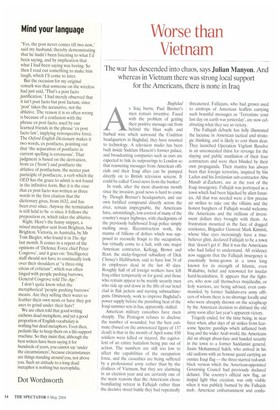Mind your language
'Yes, the post never comes till two now,' said my husband, thereby demonstrating that he hadn't been listening to what I'd been saying, and by implication that what I had been saying was boring. So then I read out something to make him laugh, which I'll come to later.
But the occasion for my original remark was that someone on the wireless had just said, 'That's a post facto justification.' I had merely observed that it isn't post facto but post factum, since 'post' takes the accusative, not the ablative. The reason it is so often wrong is because of a confusion with the phrase ex post facto, used by our learned friends in the phrase 'ex post facto law', implying retrospective force. The Oxford English Dictionary makes it two words, ex postfacto, pointing out that 'the separation of postfacto in current spelling is erroneous'. That judgment is based on the derivation, from ex ('from') and postfacto the ablative of postfactum, the neuter past participle of postfacere, a verb which the OED has the grace to admit is not found in the infinitive form. But it is the case that ex post facto was written as three words in the first citation that the dictionary gives, from 1632, and has been ever since. Anyway the termination is still held to be -o since it follows the preposition ex, which takes the ablative.
Right. Here's the funny snippet, a mixed metaphor sent from Brighton, but Brighton, Victoria, in Australia, by Mr Tom Biegler, who found it in The Age last month. It comes in a report of the opinions of 'Defence Force chief Peter Cosgrove', and it goes on: 'Intelligence staff should not have to continually look over their shoulders at "a three-ring circus of criticism", which was often tinged with people pushing barrows, General Cosgrove told The Age.'
I don't quite know what the metaphorical 'people pushing barrows' means. Are they selling their wares to feather their own nests or have they got axes to grind under their hats?
We are often told that good writing eschews dead metaphors, and yet a good proportion of English vocabulary is nothing but dead metaphors. Even then, pedants like to keep them on a life-support machine. So they insist that, although the best writers have been saying it for hundreds of years, you cannot say 'under the circumstances', because circumstances are things standing around you, not above you. Such an attitude to a long dead metaphor is nothing but necrophilia.












































































 Previous page
Previous page